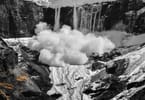(eTN) – Information unearthed during the week is adding to the disquiet in conservation circles, as unsavory connections are now beginning to emerge of the “god fathers” of the hugely controversial Serengeti highway project, big business backers, and the political elite in the country.
Tanzania has, in past years, climbed into the top of the African gold producers, now ranking a startling third already on the continent, and more concessions are waiting to be exploited. Several of those are in an area between the Serengeti and Lake Victoria, and the endpoint of the new highway at Musoma is intriguingly located in the exact same neighborhood area, where such mining concessions owners are waiting to go active.
Enroute to Musoma, the planned road is taking a right turn at Mto wa Mbu, leading along the escarpment, passing Mt. Ol Donyo Lengai, a presently active volcano, and then passing an area of another mining concession for soda ash, which India’s Tata Corporation wishes to exploit and which also met stiff resistance from conservationists and the tourism sector. Lake Natron is the only breeding ground for the East African flamingos, which come there annually to make nests of mud along the lake shores as few predators are able to withstand the hot and humid climate.
Proponents of the project, in large part the same lot as the proponents of the highway project through the Serengeti, point to the soda ash plant across the border in Kenya, which was established decades ago and where breeding of flamingos, thought to have existed until the plant was established, is now all but absent due to the disturbances caused by the extraction of the mineral, the processing and the shipping, and the establishment of a sizeably human population needed to run the operation there.
Planning for a major highway and bringing for the first time a direct road connection to two hitherto almost inaccessible areas, is bound to raise the speculation of background connections and will raise the stakes for the tourism and conservation fraternities in both Kenya and Tanzania. Big mining concerns are not exactly known to be using environmentally-friendly methods when it comes to extracting minerals and in particular gold from the African continent but are equally used to run roughshod over environmental concerns.
As a fitting example, the Niger delta in Nigeria is now one of the most polluted waterscapes and shorelines in the entire world, since for decades now the oil companies and government have stood by, apart from showing some pretence of mitigation and spill prevention, and let millions of spilled barrels of oil devastate entire stretches of these formerly rich, diverse but fragile ecosystems, now of course on their bio deathbed.
Going by recent public comments made by “experts,” i.e., paid mouthpieces of BP, about the current Gulf of Mexico oil spill, who are claiming that within a few years there would be no side effect left, they are in total disregard of the massive scale of shore pollution already seen, the complex issue of crude oil still deep underwater, and the still ongoing problems of the decades old Exxon Valdez spill in Alaska. Yet, we will surely also hear from equally unprincipled mouthpieces for the mining companies holding concessions in those areas, that neither the road, the extraction of soda ash, the extraction of other minerals and gold, nor the processing of gold – considered a highly toxic process – will do any harm to the Tanzanian environment nor displace the animals in the Serengeti.
Many of these issues are swept under the carpet right now, this being an election year in Tanzania, and with easy funding beckoning on the horizon for those singing and dancing to the tune of big business, a re-election campaign surely looks almost certain to succeed when funded and “oiled” by such windfalls. Elections are slated for October 31 of this year, and while parliament was announced dissolved by the president, the official notice is only due for publication by August 1, then providing for a three-month election campaign. But how about telling people the truth during that campaign about this project and other controversial proposals across Tanzania?
An environmental impact study for the hugely controversial highway routing must by law be carried out in Tanzania before a decision about it can be made, notwithstanding the fact that the same project was already shot down in flames by an EIA report some 14 years ago. Maybe the new EIA will do the same, but also maybe it will yield to the pressures of those who think that exploitation of every last inch of the Earth in the name of progress and prosperity justifies that we are destroying our environment faster than ever before.
The Serengeti is a UNESCO World Heritage Site, but in the grand scheme of big money and big business, this status is but a little nuisance, an obstacle to be elbowed aside so that billions can be made by a few generations.
The extinction of the North American bison herds comes to mind, as I close, and I am just wondering if the great herds of wildebeest and zebras will not long from now be condemned to near extinction, too. But what the heck, as long as the ministers can get re-elected and keep their snouts in the feeding trough, that is after all the only thing which matters… or is it?
SEO U LOKELANG HO SE NKA HO SEHLOOHO ENA:
- Proponents of the project, in large part the same lot as the proponents of the highway project through the Serengeti, point to the soda ash plant across the border in Kenya, which was established decades ago and where breeding of flamingos, thought to have existed until the plant was established, is now all but absent due to the disturbances caused by the extraction of the mineral, the processing and the shipping, and the establishment of a sizeably human population needed to run the operation there.
- As a fitting example, the Niger delta in Nigeria is now one of the most polluted waterscapes and shorelines in the entire world, since for decades now the oil companies and government have stood by, apart from showing some pretence of mitigation and spill prevention, and let millions of spilled barrels of oil devastate entire stretches of these formerly rich, diverse but fragile ecosystems, now of course on their bio deathbed.
- Yet, we will surely also hear from equally unprincipled mouthpieces for the mining companies holding concessions in those areas, that neither the road, the extraction of soda ash, the extraction of other minerals and gold, nor the processing of gold – considered a highly toxic process – will do any harm to the Tanzanian environment nor displace the animals in the Serengeti.






















